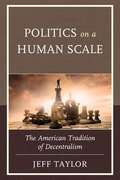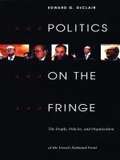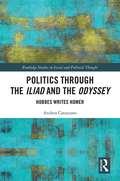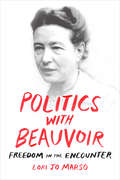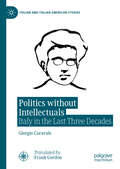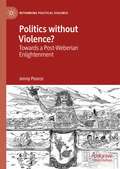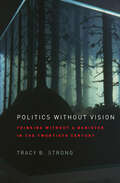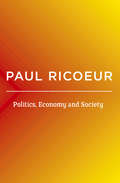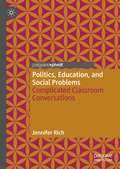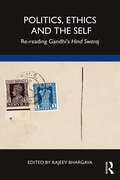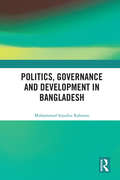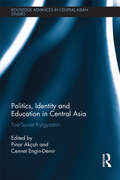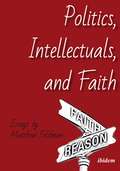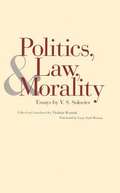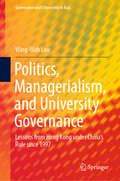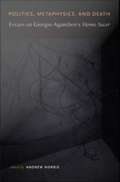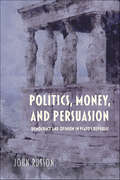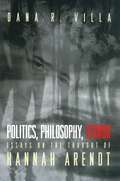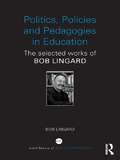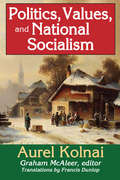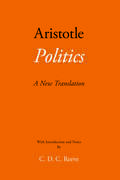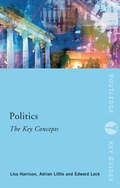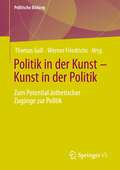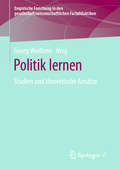- Table View
- List View
Politics on a Human Scale: The American Tradition of Decentralism
by Jeff TaylorThis is a book about political decentralization in the United States. It is one part national history, one part social commentary, one part political theory, and one part applied theology. Politics on a Human Scale covers the subject with breadth and depth. Academic jargon is kept to a minimum, terms are defined, and specific examples are given.
Politics on the Fringe: The People, Policies, and Organization of the French National Front
by Edward G. DeclairOnce a marginal political coalition, the French National Front has become the most high-profile far-right organization in Europe. In Politics on the Fringe Edward G. DeClair provides the first extensive analysis of the Front's history, from its creation in 1972 and outcast status in the early 1980s to its achievement of broad-based support and show of political strength in the 1997 elections.Using rare, in-depth interviews with twenty-nine members of the Front elite, as well as public opinion survey data and electoral results, DeClair examines the internal structure of the Front, its political agenda, and its growing influence in France. DeClair shows how the party has dramatically expanded its traditionally narrow core constituency by capitalizing upon anxieties about national identity, immigration, European unification, and rising unemployment. In illustrating how the rhetoric surrounding such topics is key to the Front's success, DeClair examines the Front's legacy by detailing the links between the French far-right and similar movements in such countries as Germany, Belgium, Austria, Italy, and the United States. Finally, Politics on the Fringe offers not only a complete picture of the Front's increasingly influential role in French partisan politics but also further insight into the resurgence of right-wing extremism throughout western societies in the late twentieth century.This volume will be of primary importance to political scientists and those engaged with European politics, culture, and history. It will also appeal to those concerned with right-wing populism and political movements.
Politics through the Iliad and the Odyssey: Hobbes writes Homer (Routledge Studies in Social and Political Thought)
by Andrea CatanzaroFacing censorship and being confined to the fringes of the political debate of his time, Thomas Hobbes turned his attention to translating Homer’s Iliad and the Odyssey from Greek into English. Many have not considered enough the usefulness of these translations. In this book, Andrea Catanzaro analyses the political value of Hobbes’ translations of Homer’s works and exposes the existence of a link between the translations and the previous works of the Malmesbury philosopher. In doing so, he asks: • What new information concerning Hobbes' political and philosophical thought can be rendered from mere translation? • What new offerings can a man in his eighties at the time offer, having widely explained his political ideas in numerous famous essays and treatises? • What new elements can be deduced in a text that was well-known in England and where there were better versions than the ones produced by Hobbes? Andrea Catanzaro’s commentary and theoretical interpretation offers an incentive to study Hobbes lesser known works in the wider development of Western political philosophy and the history of political thought.
Politics with Beauvoir: Freedom in the Encounter
by Lori Jo MarsoIn Politics with Beauvoir Lori Jo Marso treats Simone de Beauvoir's feminist theory and practice as part of her political theory, arguing that freedom is Beauvoir's central concern and that this is best apprehended through Marso's notion of the encounter. Starting with Beauvoir's political encounters with several of her key contemporaries including Hannah Arendt, Robert Brasillach, Richard Wright, Frantz Fanon, and Violette Leduc, Marso also moves beyond historical context to stage encounters between Beauvoir and others such as Chantal Akerman, Lars von Trier, Rahel Varnhagen, Alison Bechdel, the Marquis de Sade, and Margarethe von Trotta. From intimate to historical, always affective though often fraught and divisive, Beauvoir's encounters, Marso shows, exemplify freedom as a shared, relational, collective practice. Politics with Beauvoir gives us a new Beauvoir and a new way of thinking about politics—as embodied and coalitional.
Politics without Intellectuals: Italy in the Last Three Decades (Italian and Italian American Studies)
by Giorgio CaravaleThe book is the first historical reconstruction of Italian political events over the last thirty years, that is, the period from the Tangentopoli crisis of the early 1990s to the present day. In particular, the book examines, for the first time in a systematic and documented way, the controversial relationship between parties and intellectuals, highlighting the distance, not to say the unbridgeable gap, created between politics and culture in Italy in the last three decades, the decades of the so-called Second Republic. In other words, it tries to explain why the close link between politics and culture that was the hallmark of twentieth-century politics has dissolved in Italy, and through what stages we have come to a substantial incommunicability between these two worlds in the last three decades.
Politics without Stories
by David RicciLiberal candidates, scholars, and activists mainly promote pragmatism rather than large and powerful narratives - which may be called 'alpha stories' for their commanding presence over time. Alternatively, conservative counterparts to such liberals tend to promote their policy preferences in alpha stories praising effective markets, excellent traditions, and limited government. In this face-off, liberals represent a post-Enlightenment world where many modern people, following Max Weber, are 'disenchanted', while many conservatives, echoing Edmund Burke, cherish stories borrowed from the past. Politics without Stories describes this storytelling gap as an electoral disadvantage for liberals because their campaigning lacks, and will continue to lack, the inspiration and shared commitments that great, long-term stories can provide. Therefore, Ricci argues that, for tactical purposes, liberals should concede their post-Enlightenment skepticism and rally around short-term stories designed to frame, in political campaigns, immediate situations which they regard as intolerable. These may help liberals win elections and influence the course of modern life.
Politics without Violence?: Towards a Post-Weberian Enlightenment (Rethinking Political Violence)
by Jenny PearceThis book explores the potential for imagining a politics without violence and evidence that this need not be a utopian project. The book demonstrates that in theory and in practice, we now have the intellectual and scientific knowledge to make this possible. In addition, new sensibilities towards violence have generated social action on violence, turning this knowledge into practical impact. Scientifically, the first step is to recognize that only through interdisciplinary conversations can we fully realize this knowledge. Conversations between natural sciences, social sciences and the humanities, impossible in the twentieth century, are today possible and essential for understanding the phenomenon of violence, its multiple expressions and the factors that reproduce it. We can distinguish aggression from violence, the biological from the social body. In an echo of the rational Enlightenment of the eighteenth century, this book calls for an emotional Enlightenment in the twenty first and a post Weberian understanding of politics and the State.
Politics without Vision: Thinking without a Banister in the Twentieth Century
by Tracy B. Strong&“Magisterial…a frequently surprising treatment of major political thinkers.&”—Perspectives on Politics From Plato through the nineteenth century, the West could draw on comprehensive political visions to guide government and society. Now, for the first time in more than two thousand years, Tracy B. Strong contends, we have lost our foundational supports. In the words of Hannah Arendt, the state of political thought in the twentieth and twenty-first centuries has left us effectively thinking without a banister. Politics without Vision takes up the thought of seven influential thinkers, each of whom attempted to construct a political solution to this problem: Nietzsche, Weber, Freud, Lenin, Schmitt, Heidegger, and Arendt. None of these theorists were liberals; nor, excepting possibly Arendt, were they democrats—and some might even be said to have served as handmaidens to totalitarianism. And all, to a greater or lesser extent, shared the common conviction that the institutions and practices of liberalism are inadequate to the demands and stresses of the present times. In examining their thought, Strong acknowledges the political evil that some of their ideas served to foster but argues that these were not necessarily the only paths their explorations could have taken. By uncovering the turning points in their thought—and the paths not taken—Strong strives to develop a political theory that can avoid, and perhaps help explain, the mistakes of the past while furthering the democratic impulse. Confronting the widespread belief that political thought is on the decline, Strong puts forth a brilliant and provocative counterargument that in fact it has endured—without the benefit of outside support. A compelling rendering of contemporary political theory, Politics without Vision is sure to provoke discussion among scholars in many fields.
Politics, Economy, and Society: Writings and Lectures
by Paul RicoeurThe philosophy of Paul Ricoeur is rarely viewed through the lens of political philosophy, and yet questions of power, and of how to live together in the polis, were a constant preoccupation of his writings. This volume brings together a selection of his texts spanning six decades, from 1958 to 2003, which together present Ricoeur’s political project in its coherence and diversity. In Ricoeur’s view, the political is the realm of a tension between “rationality” (the attempt to provide a coherent explanation of the world) and “irrationality,” which manifests itself in force and repression. This “political paradox” lies at the heart of politics, for the claim to explain the world generates its own form of violence: the more one desires the good, the more one is inclined to impose it. Ricoeur warns citizens, the guardians of democracy, against any totalizing system of thought and any dogmatic understanding of history. Power should be divided and controlled, and Ricoeur defends a form of political liberalism in which states are conscious of the limits of their power and respectful of the freedom of their citizens. Ranging from questions of power and repression to those of ethics, identity, and responsibility, these little-known political texts by one of the leading philosophers of the twentieth century will be of interest to students and scholars of philosophy, politics, and theology and to anyone concerned with the great political questions of our time.
Politics, Education, and Social Problems: Complicated Classroom Conversations
by Jennifer RichThis book offers an innovative perspective on the intersection of politics, education, and social problems. It considers how we can create social change by talking about politics and social problems in more open, direct, and inclusive ways in educational spaces. Drawing on data from a range of settings, this book closely examines how and when complicated conversations take place in classrooms, schools, and communities. The book tackles a series of hot-button, timely issues, including race, religion, politics, and gender, and turns a critical eye to schools and the communities in which they are situated; the conversations adults have—and pointedly ignore—with one another; and, perhaps most critically, the politics that shape our society.
Politics, Ethics and the Self: Re-reading Gandhi’s Hind Swaraj
by Rajeev BhargavaHind Swaraj by Mahatma Gandhi is arguably the greatest text to have emerged from the anti-colonial movement in India and the first to seriously challenge the cultural and civilizational premises of the colonizers’ mentality. It is also the first text in India that falls within the broad tradition of modern political philosophy, advancing a complex cluster of theses with conceptual sensitivity, analytical precision, and sustained argument. This book critically engages with Hind Swaraj and explores the fascinating and subtle dialogue set up by Gandhi between the characters of the reader and the editor. With essays from leading contemporary thinkers on Gandhi, the volume looks at themes such as Gandhi on epistemic servitude, decolonization, and intercultural translation; his complex critique of modern civilization; his views on the empire, democracy, citizenship, and violence; the normative structure of Gandhian thought; Gandhi and the political praxis of educational reconstruction; and how to read this text. An important intervention in Gandhian studies, this book will be useful for scholars and researchers of peace studies, political philosophy, Indian philosophy, Indian political thought, political sociology, and South Asian studies.
Politics, Governance and Development in Bangladesh
by Muhammad Sayadur RahmanThis book explores the relationship between bureaucrats and elected politicians in Bangladesh and discusses how this impacts governance and development in the country from an empirical perspective. It looks at the interplay of politics and bureaucracy in ancient societies, western democracies and in the developing world while highlighting the uniqueness of the Bangladesh experience and its indigenous contexts of local governance. The author presents a historical overview of the nature of political development, shift of regimes in Bangladesh, and the role of various agents and stakeholders. Through a detailed study, the book provides an analytical and theoretical framework to understanding the linkages between politics and bureaucracy, governance and development in South Asia and Bangladesh, with implications for geopolitics and economic growth. This book will be of interest to scholars, researchers and students of political economy, development studies, public administration, comparative politics as well as to policymakers, bureaucrats, government bodies, and especially those concerned with Bangladesh.
Politics, Identity and Education in Central Asia: Post-Soviet Kyrgyzstan
by Pınar Akçalı Cennet Engin-DemirFocusing on the areas of politics, identity and education, this book looks at some of the most pressing and challenging issues that Kyrgyzstan faces in the post-Soviet era. It argues that Kyrgyzstan is challenged with oscillations between the old and the new on the one hand, and domestic and international on the other. The book analyses the process of post-Soviet transition in today’s Kyrgyzstan by focusing on the political elites, some of the major identity problems and educational issues. It discusses how Kyrgyzstan’s first president in the post-Soviet era had already been an exceptional leader even prior to the collapse of the Soviet Union in terms of his democratic and liberal tendencies. The book goes on to look at how identity is a major factor in the country, shaped to a large extent by genealogical factors and patron-client mechanisms on the one hand, and religious considerations on the other. Finally, it highlights how education has been perceived as a very influential agent of socialization that develops not only literacy and other skills, but also common attitudes and values that are considered essential to any society. By evaluating these three areas, the book argues that Kyrgyzstan cannot isolate itself from the demands, priorities and pressures of international actors, which sometimes are in conflict with the country’s domestic conditions. It is of interest to students and scholars of Asian Studies, Politics and International Relations.
Politics, Intellectuals, and Faith: Essays
by Matthew FeldmanThis wide-ranging collection of academic essays examines the various undertakings by modern intellectuals and ideologues in the process of propaganda and political debate. Matthew Feldman calls attention to the substantial role played in post-Great War Europe and the US by religions—both familiar monotheisms like Christianity and secular ‘political faiths’—over the last century of upheaval and revolutionary change. While the first part considers Ezra Pound as a case study in fascist ʼconversion’ in Mussolini’s Italy, leading to extensive propaganda, the second half examines other fascist ideologues like Martin Heidegger to fascist murderer Anders Behring Breivik, before turning to other leading ideologies in modern Europe and the US, communism and liberalism, covering key figures from Thomas Merton and Albert Camus to the Russian Constructionists and Samuel Beckett, with especial focus on the subjects of modern warfare, political terrorism, and genocide, ranging from Stalinist gulags to the war in Iraq. With thought-provoking discussion of the interplay between belief and modern politics as understood by familiar intellectual voices, this volume will be of interest to scholars and general readers alike.
Politics, Law and Morality: Essays By V. S. Soloviev
by Vladimir Soloviev Vladimir WozniukConsidered one of Russia's greatest philosophers, Vladimir Soloviev (1853-1900) was also a theologian, historian, poet, and social and political critic. His works have emerged to enjoy renewed attention in post-Soviet Russia, and his concerns echo in contemporary discussions of politics, law, and morality. In this collection of Soloviev's essays -- many translated into English for the first time -- the philosopher explores an array of social issues, from the death penalty to nationalism to women's rights. Soloviev reacts against the tradition of European rationalist thought and seeks to synthesize religious philosophy, science, and ethics in the context of a universal Christianity. In these writings he reveals the centrality of human rights in his Christian world-view, not only as an abstract theory but also as an inspiration in everyday life. In a substantive introduction and copious annotations to the essays, Vladimir Wozniuk points out distinctive and often overlooked features of Soloviev's works while,illuminating his place within both the Russian and Western intellectual traditions.
Politics, Managerialism, and University Governance: Lessons from Hong Kong under China’s Rule since 1997 (Governance and Citizenship in Asia)
by Wing-Wah LawThis book explores the interplay between politics, managerialism, and higher education, and the complex linkages between politics and public universities in Hong Kong. Since the mid-20th century, literature on the state, market, and higher education has focused on the state’s shifting role from the direct administration to the supervision of higher education, and its increased use of market and managerial principles and techniques to regulate public universities. However, very few studies have addressed the political influences on university governance produced by changing state-university-market relationships, the chancellorship of public universities, or students’ and academics’ civic engagement with regard to sensitive political issues. The book examines both the positive and problematic outcomes of using market principles and managerialism to reform public higher education; questions the longstanding tradition of university chancellorship; explores the issue of external members holding the majority on university governing boards; probes into the dilemma of either relying on the system or a good chancellor and external members to preserve universities’ autonomy and academic freedom; and assesses the cost of students’ and academics’ civic engagement with regard to politically sensitive issues.
Politics, Metaphysics, and Death: Essays On Giorgio Agamben's Homo Sacer
by Andrew NorrisThe Italian philosopher Giorgio Agamben is having an increasingly significant impact on Anglo-American political theory. His most prominent intervention to date is the powerful reassessment of sovereignty and the politics of life and death laid out in his multivolume Homo Sacer project. Agamben argues that in both the modern world and the ancient, politics inevitably involves a sovereign decision that bans some individuals from the political and human communities. For Agamben, the Nazi concentration camps--in which some inmates are reduced to a form of living death--are not a political aberration but instead the place where this essential political decision about life most clearly reveals itself. Engaging specifically with Homo Sacer, the essays in this collection draw out and contend with the wide-ranging implications of Agamben's radical and controversial interpretation of modern political life. The contributors analyze Agamben's thought from the perspectives of political theory, philosophy, jurisprudence, and the history of law. They consider his work not only in relation to that of his major interlocutors--Hannah Arendt, Michel Foucault, Carl Schmitt, Walter Benjamin, and Martin Heidegger--but also in relation to the thought of Plato, Pindar, Heraclitus, Descartes, Kafka, Bataille, and Derrida. The essayists' approaches are varied, as are their ultimate evaluations of the cogency and accuracy of Agamben's arguments. This volume also includes an original essay by Agamben in which he considers the relation of Benjamin's "Critique of Violence" to Schmitt's Political Theology. Politics, Metaphysics, and Death is a necessary, multifaceted exposition and evaluation of the thought of one of today's most important political theorists. Contributors: Giorgio Agamben, Andrew Benjamin, Peter Fitzpatrick, Anselm Haverkamp, Paul Hegarty, Andreas Kalyvas, Rainer Maria Kiesow , Catherine Mills, Andrew Norris, Adam Thurschwell, Erik Vogt, Thomas Carl Wall
Politics, Money, and Persuasion: Democracy and Opinion in Plato's Republic (Studies in Continental Thought)
by John RussonIn Politics, Money, and Persuasion, distinguished philosopher John Russon offers a new framework for interpreting Plato's The Republic. For Russon, Plato's work is about the distinctive nature of what it is to be a human being and, correspondingly, what is distinctive about the nature of human society. Russon focuses on the realities of our everyday experience to come to profoundly insightful assessments of our human realities: the nature of the city, the nature of knowledge, and the nature of human psychology. Russon's argument concentrates on the ambivalence of logos, which includes reflections on politics and philosophy and their place in human life, how humans have shaped the environment, our interactions with money, the economy, and the pursuit of the good in social and political systems. Politics, Money, and Persuasion offers a deeply personal but also practical kind of philosophical reading of Plato's classic text. It emphasizes the tight connection between the life of city and the life of the soul, demonstrating both the crucial role that human cognitive excellence and psychological health play in political and social life.
Politics, Philosophy, Terror: Essays on the Thought of Hannah Arendt
by Dana VillaHannah Arendt's rich and varied political thought is more influential today than ever before, due in part to the collapse of communism and the need for ideas that move beyond the old ideologies of the Cold War. As Dana Villa shows, however, Arendt's thought is often poorly understood, both because of its complexity and because her fame has made it easy for critics to write about what she is reputed to have said rather than what she actually wrote. Villa sets out to change that here, explaining clearly, carefully, and forcefully Arendt's major contributions to our understanding of politics, modernity, and the nature of political evil in our century. Villa begins by focusing on some of the most controversial aspects of Arendt's political thought. He shows that Arendt's famous idea of the banality of evil--inspired by the trial of Adolf Eichmann--does not, as some have maintained, lessen the guilt of war criminals by suggesting that they are mere cogs in a bureaucratic machine. He examines what she meant when she wrote that terror was the essence of totalitarianism, explaining that she believed Nazi and Soviet terror served above all to reinforce the totalitarian idea that humans are expendable units, subordinate to the all-determining laws of Nature or History. Villa clarifies the personal and philosophical relationship between Arendt and Heidegger, showing how her work drew on his thought while providing a firm repudiation of Heidegger's political idiocy under the Nazis. Less controversially, but as importantly, Villa also engages with Arendt's ideas about the relationship between political thought and political action. He explores her views about the roles of theatricality, philosophical reflection, and public-spiritedness in political life. And he explores what relationship, if any, Arendt saw between totalitarianism and the "great tradition" of Western political thought. Throughout, Villa shows how Arendt's ideas illuminate contemporary debates about the nature of modernity and democracy and how they deepen our understanding of philosophers ranging from Socrates and Plato to Habermas and Leo Strauss. Direct, lucid, and powerfully argued, this is a much-needed analysis of the central ideas of one of the most influential political theorists of the twentieth century.
Politics, Policies and Pedagogies in Education: The selected works of Bob Lingard
by Bob LingardIn the World Library of Educationalists, international experts compile career long collections of what they judge to be their finest pieces of work – extracts from books, key articles, salient research findings, major theoretical and practical contributions – so the world can read them in a single manageable volume. Readers will be able to follow the themes and strands and see how their work contributes to the development of the field. Bob Lingard has spent the last 30 years researching and writing in universities in Australia, England and Scotland about changing education policy issues. His work is written from a sociological perspective and with a commitment to social justice. He is the co-editor and co-author of 17 books and more than 100 journal articles and book chapters. In Politics, Policies and Pedagogies in Education, Bob Lingard provides critical sociological engagement with the politics of education. The focus is education policy and the impact of globalization, including epistemological and methodological issues necessary for researching education policy today. Topics analyzed include: educational restructuring new accountabilities and testing mediatization of education policy policy as numbers the global policy field and policy borrowing pedagogies. Lingard also considers the nature of educational research today. He has selected 12 of his key writings and in a critical introduction situates and contextualizes the work against key developments in the field and in the changing world.
Politics, Values, and National Socialism
by Aurel KolnaiThe essays in this collection, spanning 1925 to 1970, confirm Aurel Kolnai's place as one of the great conservative theorists of the twentieth century. Kolnai carefully analyzes the leading intellectual positions and thinkers of his day, the dominant social movements, and the prevailing moral influences—psychoanalysis, fascism, and National Socialism. He documents how they run counter to the architecture of civilization.Kolnai is relatively unknown outside philosophical circles, but Politics, Values, and National Socialism provides an overview of his moral philosophy. In most moral philosophy books one finds pages devoted to the major theories of ethics. This volume is different. It seeks to address the larger moral question of what kind of thought works against morality, and by implication, how one can defend morality.Eager to protect the surviving islands of Liberal Civilization, Kolnai's concern is really one of theory. He shows that much of what passes for moral theory is subversive of moral order. All who think that totalitarianism is a permanent threat, and who suspect that ideas can quickly be dangerously distorted in times of social unrest, will find plenty of clarifying ideas in this volume.
Politics: A New Translation
by Aristotle C. D. ReeveThis new translation of Aristotle's Politics is a model of accuracy and consistency and fits seamlessly with the translator's Nicomachean Ethics, allowing the two to be read together, as Aristotle intended. Sequentially numbered endnotes provide the information most needed at each juncture, while a detailed Index of Terms indicates places where focused discussion of key notions occurs. A general Introduction prepares the reader for the work that lies ahead, explaining what sort of work it is and what sort of evidence it relies on.
Politics: The Key Concepts (Routledge Key Guides)
by Lisa Harrison Adrian Little Ed LockPolitics: The Key Concepts is an up-to-date and broad-ranging introduction to the terms that lie at the heart of political discourse. Entries are drawn from areas such as political theory, international politics, political science and methodology. As well as explaining core, established principles, this informative guide explores some of the more complex, topical and contested concepts from the world of politics. Concepts covered include: Capitalism Class Identity Institutionalism Referendum Marxism Pluralism Postmodernism Socialism Social Constructivism In an accessible A-Z format with helpful cross-referencing and suggestions for further reading, Politics: The Key Concepts is an invaluable reference for all students of politics, international relations and related courses.
Politik in der Kunst – Kunst in der Politik: Zum Potential ästhetischer Zugänge zur Politik (Politische Bildung)
by Werner Friedrichs Thomas GollDer Band versammelt Beiträge der Arbeitsgruppe Hermeneutische Politikdidaktik zum Thema Politik und Kunst. Politik hat sich schon immer ästhetischer Mittel bedient, um sich zu inszenieren. Umgekehrt ist Kunst ein Reflex auf die politische Verfasstheit der Gesellschaft. Kunst eröffnet damit einen Zugang zur Politik mit hohem Potential für die politische Bildung.
Politik lernen: Studien und theoretische Ansätze (Empirische Forschung in den gesellschaftswissenschaftlichen Fachdidaktiken)
by Georg WeißenoIm wissenschaftlichen Diskurs über politische Bildung lässt sich seit etwa dreißig Jahren eine starke Betonung empirischer Forschung feststellen. Durch die Entwicklung systematischer empirische Forschung hat sich zugleich die Frage nach der theoretischen Begründung der Politikdidaktik neu gestellt. Die Autorinnen und Autoren des vorliegenden Bandes untersuchen die Wissensvermittlung als eine Hauptaufgabe des Politikunterrichts. Sie verbinden sie mit individuellen Merkmalen wie der Motivation, unterrichtlichen Determinanten wie der Unterrichtsqualität und Kontextfaktoren wie dem Migrationshintergrund. Die theoretischen und empirischen Entwicklungen haben zu einer Ausdifferenzierung der Politikdidaktik und zu einem neuen Blick auf die Praxis des Politikunterrichts geführt.
